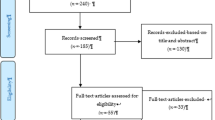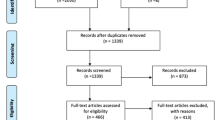Abstract
Alcohol screening and brief intervention in primary care reduce harmful alcohol use but are rarely conducted in Brazil. This study describes health professionals’ perceptions of patients’ harmful alcohol use. A modified grounded theory approach drawing on purposive sampling was used to secure interviews from thirty-three primary care professionals between September and November 2018. Data analysis was iterative; initial coding was developed by the full research team and refined using formative and axial coding. Alcohol symptomology varied and professionals associated harmful alcohol use with patients’ economic hardship. Although health professionals rarely identified alcohol-related problems among their patients, when alcohol problems were identified, it was often through consultations about other symptoms. Compared to drug use, low to moderate alcohol use was not considered harmful, supported in part by a widespread acceptance of alcohol use. Brazil’s universal primary care system uses a collaborative care model to support integrated treatment of medical and mental health conditions, but alcohol screenings often occur only after problems manifest. Given limited early identification of harmful alcohol use in primary care, it is necessary to improve professionals’ training related to alcohol screening and brief intervention to reduce alcohol-related disability-adjusted life years.
Similar content being viewed by others
References
Amaral-Sabadini, M. B., Saitz, R., & Souza-Formigoni, M. L. O. (2010). Do attitudes about unhealthy alcohol and other drug (AOD) use impact primary care professionals’ readiness to implement AOD-related preventive care? Drug and Alcohol Review, 29(6), 655–661. https://doi.org/10.1111/j.1465-3362.2010.00222.x
Amaral, M. B., Ronzani, T. M., & Souza-Formigoni, M. L. O. (2010). Process evaluation of the implementation of a screening and brief intervention program for alcohol risk in primary health care: An experience in Brazil. Drug and Alcohol Review, 29(2), 162–168.
Babor, T. F., Higgins-Biddle, J. C., & Organization, W. H. (2001). Brief intervention for hazardous and harmful drinking: A manual for use in primary care.
Bastos, F. I. P. M., de Vasconcellos, M. T. L., De Boni, R. B., Reis, N. B. d., & Coutinho, C. F. d. S. (2017). III Levantamento Nacional sobre o uso de drogas pela população brasileira. In: ICICT/FIOCRUZ.
Blankertz, L. (1998). The value and practicality of deliberate sampling for heterogeneity: A critical multiplist perspective. 19(3), 307–324.
Collins, P. Y., Patel, V., Joestl, S. S., March, D., Insel, T. R., Daar, A. S., . . . Fairburn, C. (2011). Grand challenges in global mental health. Nature, 475(7354), 27
Corbin, J. M., & Strauss, A. (1990). Grounded theory research: Procedures, canons, and evaluative criteria. Qualitative Sociology, 13(1), 3–21.
D'Amour, D., Ferrada-Videla, M., San Martin Rodriguez, L., & Beaulieu, M. D. (2005). The conceptual basis for interprofessional collaboration: Core concepts and theoretical frameworks. Journal of interprofessional care, 19(sup1), 116–131.
Denzin, N. K. (2011). & Lincoln YS. The Sage handbook of qualitative research: Sage.
da Costa e Silva, V. . L., Pantani, D., Andreis, M., Sparks, R., & Pinsky, I. (2013). Bridging the gap between science and public health: Taking advantage of tobacco control experience in Brazil to inform policies to counter risk factors for non-communicable diseases. Addiction, 108(8), 1360–1366.
Eaton, J., McCay, L., Semrau, M., Chatterjee, S., Baingana, F., Araya, R., . . . Saxena, S. (2011). Scale up of services for mental health in low-income and middle-income countries. The Lancet, 378(9802), 1592-1603. https://doi.org/10.1016/S0140-6736(11)60891-X
Gonçalves, D. A., Mari, J., & d. J., Bower, P., Gask, L., Dowrick, C., Tófoli, L. F., … Fortes, S. . (2014). Brazilian multicentre study of common mental disorders in primary care: Rates and related social and demographic factors. Cadernos De Saude Publica, 30, 623–632.
Graever, L. (2013). A assistência ao indivíduo com problemas relacionados ao uso de álcool e drogas ilícitas na Estratégia Saúde da Família (Doctoral Dissertation). Universidade do Estado do Rio de Janeiro.
Griswold, M. G., Fullman, N., Hawley, C., Arian, N., Zimsen, S. R., Tymeson, H. D., . . . Salama, J. S. J. T. L. (2018). Alcohol use and burden for 195 countries and territories, 1990–2016: A systematic analysis for the Global Burden of Disease Study 2016. 392(10152), 1015–1035.
Guimarães, F. J., Fernandes, A. F. C., & Pagliuca, L. M. F. (2015). Intervenções para enfrentamento do abuso de álcool: revisão integrativa. Revista Eletrónica de Enfermagem, 17(3).
Haley, S. J., Athié, K., Wyka, K. E., Salgado, M. A., Teixeira, D. S., Alves, K., . . . Addiction. (2019). Implementation Protocol To Increase Problematic Alcohol Use Screening and Brief Intervention in Brazil’s National Health System. 1–19.
Institute for Health Metrics and Evaluation. (2019). Global burden of disease compare. Retrieved from https://vizhub.healthdata.org/gbd-compare/. Accessed 23 Jan 2020
Joseph, J., & Basu, D. (2016). Efficacy of brief interventions in reducing hazardous or harmful alcohol use in middle-income countries: Systematic review of randomized controlled trials. Alcohol and Alcoholism, 52(1), 56–64.
Kaner, E. F., Beyer, F. R., Muirhead, C., Campbell, F., Pienaar, E. D., Bertholet, N., . . . Burnand, B. (2018). Effectiveness of brief alcohol interventions in primary care populations (Publication no. https://doi.org/10.1002/14651858.CD004148.pub4). from Cochrane Library https://www-ncbi-nlm-nih-gov.ccny-proxy1.libr.ccny.cuny.edu/pmc/articles/PMC6491186/. Accessed 23 Jan 2020
Kaner, E. F., Dickinson, H. O., Beyer, F. R., Campbell, F., Schlesinger, C., Heather, N., . . . Pienaar, E. D. (2007). Effectiveness of brief alcohol interventions in primary care populations. The Cochrane Library.
Kohn, R., Saxena, S., Levav, I., & Saraceno, B. (2004). The treatment gap in mental health care. Bulletin of the World Health Organization, 82, 858–866.
Leite, D. C., Andrade, A. B., & Bosi, M. L. M. (2013). The integration of Psychology in units of support for the Family Health Program. Physis: Revista de Saúde Coletiva, 23(4), 1167–1187.
Lieber, E., Weisner, T., & Taylor, J. (2011). Dedoose software. In. Sociocultural Research Consultants.
Lindelow, M., & Araujo, E. C. (2014). Universal Health Coverage for Inclusive and Sustainable Development: Country Summary Report for Brazil Washington, DC: World Bank Retrieved from http://documents.worldbank.org/curated/en/199721468021280000/pdf/912140WP0UHC0C0Box385329B00PUBLIC0.pdf. Accessed 23 Jan 2020
Macinko, J., Mullachery, P., Silver, D., Jimenez, G., & Neto, O. L. M. (2015). Patterns of alcohol consumption and related behaviors in Brazil: Evidence from the 2013 National Health Survey (PNS 2013). PloS one, 10(7), e0134153.
Marinho, F., de Azeredo Passos, V. M., Malta, D. C., França, E. B., Abreu, D. M., Araújo, V. E., . . . Duncan, B. B. (2018). Burden of disease in Brazil, 1990–2016: A systematic subnational analysis for the Global Burden of Disease Study 2016. The Lancet, 392(10149), 760-775
Ministério da Saúde. (2010). Diretrizes do NASF: Núcleo de Apoio a Saúde da Família. Cadernos de Atenção Básica. Retrieved from http://189.28.128.100/dab/docs/publicacoes/cadernos_ab/abcad27.pdf. Accessed 23 Jan 2020
Ministério da Saúde. (2019). E-gestor Atenção Básica: Informação e gestão da Atenção Básica Retrieved from https://egestorab.saude.gov.br/paginas/acessoPublico/relatorios/relHistoricoCoberturaAB.xhtml
Pan American Health Organization, (2018). Alcohol policy scoring: Assessing the level of implementation of the WHO Global strategy to reduce the harmful use of alcohol in the Region of the Americas. ISBN: 978–92–75–12045–3. Retrieved from: https://iris.paho.org/bitstream/handle/10665.2/49679/9789275120453_eng.pdf?sequence=2&isAllowed=y. Accessed 23 Jan 2020
Pereira, M. O., Angioni, B. M., Ferreira, N. d. C., Oliveira, M. A. F. d., Vargas, D. d., & Colvero, L. d. A. (2013). Efetividade da intervenção breve para o uso abusivo de álcool na atenção primária: Revisão sistemática.
Poznyak, V., Reed, G., & Medina-Mora, M. (2018). Aligning the ICD-11 classification of disorders due to substance use with global service needs. Epidemiology and Psychiatric Sciences, 27(3), 212–218.
Ronzani, T. M., Higgins-Biddle, J., & Furtado, E. F. (2009). Stigmatization of alcohol and other drug users by primary care providers in Southeast Brazil. Social Science & Medicine, 69(7), 1080–1084.
Ronzani, T., Oliveira, M., Mota, D., Cruvinel, E., Laport, T., & Martins, L. (2012). Assessing the impact of screening, brief intervention, and referral to treatment implementation on attitudes toward and moralization about alcohol, tobacco, and other drug use. In Addiction Science & Clinical Practice (Vol. 7, No. 1, pp. 1–1). BioMed Central.
Soares, J., & Vargas , D. D. (2019). Effectiveness of brief group intervention in the harmful alcohol use in primary health care. Revista De Saúde Pública, 53, 04.
Sutherland, J., Nguyen, D., & Hopkins, S. (2019). Sonix. San Francisco, California. Retrieved from https://sonix.ai/. Accessed 23 Jan 2020
Thornicroft, G. (2012). Evidence-based mental health care and implementation science in low-and middle-income countries. Epidemiology and Psychiatric Sciences, 21(3), 241–244.
Thota, A. B., Sipe, T. A., Byard, G. J., Zometa, C. S., Hahn, R. A., McKnight-Eily, L. R., ... & Gelenberg, A. J. (2012). Collaborative care to improve the management of depressive disorders: a community guide systematic review and meta-analysis. American journal of preventive medicine, 42(5), 525-538
Tolley, E. E., Ulin, P. R., Mack, N., Robinson, E. T., & Succop, S. M. (2016). Qualitative methods in public health: a field guide for applied research: John Wiley & Sons.
Vendrame, A. (2017). When evidence is not enough: A case study on alcohol marketing legislation in Brazil. Addiction, 112, 81–85.
Wakida, E. K., Talib, Z. M., Akena, D., Okello, E. S., Kinengyere, A., Mindra, A., & Obua, C. (2018). Barriers and facilitators to the integration of mental health services into primary health care: A systematic review. Systematic Reviews, 7(1), 211.
World Health Organization. (1992). The ICD-10 Classification of Mental and Behavioural Disorders: Clinical descriptions and diagnostic guidelines. Retrieved from https://www.who.int/substance_abuse/terminology/ICD10ClinicalDiagnosis.pdf. Accessed 23 Jan 2020
World Health Organization. (2001). The alcohol use disorders identification test: Guidelines for use in primary care. World Health Organization.
World Health Organization. (2010). Atlas on substance use (2010): Resources for the prevention and treatment of substance use disorders: World Health Organization.
World Health Organization. (2017). mhGAP training manuals for the mhGAP intervention guide for mental, neurological and substance use disorders in non-specialized health settings, version 2.0 (for field testing). Geneva: World Health Organization Retrieved from https://apps.who.int/iris/bitstream/handle/10665/259161/WHO-MSD-MER-17.6-eng.pdf?sequence=1&isAllowed=y. Accessed 23 Jan 2020
World Health Organization. (2018). Global status report on alcohol and health 2018. (9241565632). Geneva: World Health Organization Retrieved from https://www.who.int/substance_abuse/publications/global_alcohol_report/gsr_2018/en/. Accessed 23 Jan 2020
Acknowledgements
The authors thank the mental health and addictions staff within the city of Rio de Janeiro, area coordinators, managers, and the staff at the primary care health units in participating programmatic. The authors thank the Fulbright Commission, CAPES, UERJ, Coordinating Study Centers’ staff, and the following: Bianca Pereira de Souza, Adriana Teixeira dos Santos, Leandra Urena, Gabriella Souza Oliberia Freitas, and interviewers: Angela Machado da Silva, Alice Lopes do Amaral Menezes, and Natalia Lelou Fazzioni.
Funding
Fulbright Scholars Award and in-kind support from Universidade do Estado do Rio de Janeiro.
Author information
Authors and Affiliations
Corresponding author
Ethics declarations
Competing Interests
The authors declare no competing interests.
Additional information
Publisher's Note
Springer Nature remains neutral with regard to jurisdictional claims in published maps and institutional affiliations.
Rights and permissions
About this article
Cite this article
Haley, S.J., Vargens, R., da Silva Sudré, A.A. et al. Perceptions of Patients’ Alcohol Use and Related Problems Among Primary Care Professionals in Rio de Janeiro. Int J Ment Health Addiction 21, 1139–1156 (2023). https://doi.org/10.1007/s11469-021-00648-2
Accepted:
Published:
Issue Date:
DOI: https://doi.org/10.1007/s11469-021-00648-2




